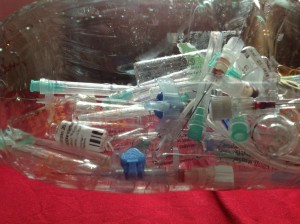OPERATIONS UPDATE: 1/27/26 BWS, Inc. is back to full operations. Please contact us with any questions or concerns about your scheduled pick up - (410) 437-6590 or customercare@bwaste.com
Types of Biohazardous Waste and Disposal Procedures

When it comes to medical waste, there is one sub-category that requires special attention from medical facilities—biohazardous waste. Biohazardous waste is exactly what it sounds like: waste that potentially contains biological agents that may pose risk to the population if released in the environment. These agents may include bacteria, parasites, mold, viruses and other microorganisms that can harm health or lead to mortality in humans. Biohazardous waste can be generated in many places inside your facility:
- In pathology laboratories that analyze human or animal cultures for presence of pathogens.
- In research labs that develop vaccines or study infection agents.
- In operating/autopsy rooms where infected tissues are removed.
- In patient rooms during patient care.
The Four Main Types of Biohazardous Waste
Solid Biohazardous Waste
Solid biohazardous waste consists of non-sharp items that came in contact with human or animal specimen materials, such as tissues or body fluids. These items include, but are not limited to petri dishes, pipettes, personal protective equipment, towels and linens and any sort of dishes and containers. Note that sharps (scalpels, needles, etc.) are managed separately and so are easily breakable items like blood vials that could become sharp. Collections and Disposal Procedures This type of waste should be collected in a designated container with a lid that is lined with an autocalve bag and marked with the biohazard symbol. Solid biohazardous waste can be decontaminated on site through autoclaving and disposed as regular medical waste through an approved landfill. If it's not decontaminated, it has to be collected by your Maryland waste management company for proper decontamination and disposal.
Liquid Biohazardous Waste
Liquid biohazardous waste consists mainly of blood and body fluids that could be contaminated with infectious agents. If the amount of liquid is less than 25 mls, it can generally be considered and disposed of as solid biohazardous waste. Collection and Disposal Procedures All liquid biohazardous waste must be collected in leak-proof containers that are secured against tipping over and are labeled as biohazard. As an additional security measure, the primary liquid containers can be placed in a secondary vessel, such as a tray or a bucket. Most liquid waste can be disposed of by either chemical treatment with bleach or autoclaving on the liquid cycle. If the liquids contain a mixture of bodily fluid and chemical waste, contact your medical waste removal provider for disposal recommendations.
Sharp Biohazardous Waste
Sharp biohazardous waste (or simply sharps) is any medical device that is sharp enough to puncture skin (not to mention a plastic bag) and that had been in contact with potentially infectious biological material. Sharps include things like scalpels, needles, microscope slides, saw blades, broken glass vials, etc. Collection and Disposal Procedures There are containers specifically designated for collecting sharps. They are designed to be resistant to puncture, leak-proof and safe to handle. Regardless of the biohazard status, all sharps should be collected in such containers, but biohazardous sharps will be labeled with a corresponding symbol. Contaminated sharps are picked up and disposed of by your local medical waste contractor. Plastic serological pipettes, while not sharp enough to puncture skin, can go through plastic bags, which is why they should be managed either as sharps or otherwise separated from the rest of the solid biohazardous waste.
Pathological Biohazardous Waste
Pathological waste includes removed human (or animal) organs, tissues and body parts that have been exposed to infectious agents. Collection and Disposal Procedures To prevent potential leaks, pathological waste should be double-bagged and stored similar to liquid waste in secondary containers. It is commonly disposed of through incineration or chemical treatment, but not autoclaving. Do you have any questions about how to handle biohazardous waste in your facility? Feel free to contact BWS for advice, recommendations or medical waste collection services in Maryland, Virginia, Pennsylvania, Delaware, West Virginia and Washington, DC.
Ready to get started?
We offer a variety of competitively priced service options with no contracts or hidden fees. Request a free quote.
Our Dedication to Providing the Highest Quality Regulated Waste Services
is Shown in What Our Clients Say About Our Work
We provide an outstanding value and service to our regulated waste customers and pride ourselves over the last 50 years on our 100% customer satisfaction with 99% customer retention ratio.
Paul R Miller, D.D.S. and Team
ZytoGen Patient Services
Akbar Masood, D.D.S.
Chris Donaldson
Dharani Jasthi
Tomicka Jackson-George, D.M.D.
Louis Sachs, D.D.S.
Kate Blair English
Dave Ryan
Kerry Owens, Avalon Plastic Surgery
Jamie Fleming, National Spine & Pain Centers
Keith Roberts, Biomatrix Specialty Pharmacy
Mireia Pedragosa Marin, Synergy Research
Rebecca Crouse, Randolph Macon Academy
Melissa C, Patriot Chiropractic
Dr. Rosario Ignacio
Dr. Thomas Lutz, Odenton Family Dentistry
Dr. Louis Sachs, DDS
Eric B.
Brenda Shah
Stay connected - Be the first to know!
Get BWS news and promotions straight to your inbox
Don't worry. We won't sell your information!




